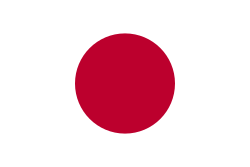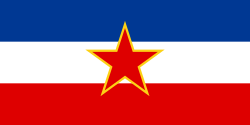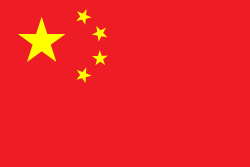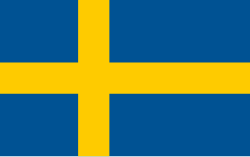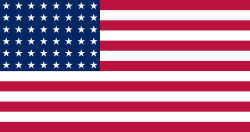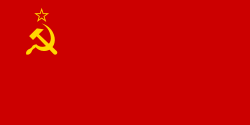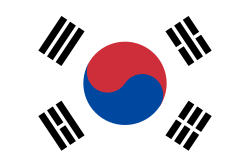Koji Kimura
| Koji Kimura | |
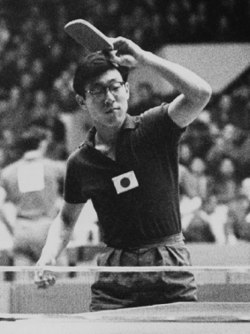 | |
| Född | december 1940 |
|---|---|
| Medborgare i | Japan |
| Utbildad vid | Wasedauniversitetet |
| Sysselsättning | Bordtennisspelare[1] |
| Redigera Wikidata | |
| Koji Kimura | ||
| Bordtennis, herrar | ||
| Nation: | ||
|---|---|---|
| Världsmästerskap | ||
| Guld | Stockholm 1967 | Herrlag |
| Guld | Ljubljana 1965 | Mixeddubbel |
| Guld | Prag 1963 | Mixeddubbel |
| Guld | Peking 1961 | Herrdubbel |
| Silver | Stockholm 1967 | Mixeddubbel |
| Silver | Ljubljana 1965 | Herrlag |
| Silver | Prag 1963 | Herrlag |
| Silver | Peking 1961 | Herrlag |
| Brons | Stockholm 1967 | Herrsingel |
Koji Kimura, är en japansk före detta bordtennisspelare och världsmästare i dubbel, mixed dubbel och lag.
Han spelade sitt första VM 1961 och 1967 - 7 år senare sitt 4:e och sista.
Under sin karriär tog han 9 medaljer i bordtennis-VM, 4 guld, 4 silver och 1 brons.
För närvarande sitter han i ITTF:s Executive Committe.[2]
Meriter
- Bordtennis VM
- 1961 i Peking
- 1:a plats dubbel med Nobuya Hoshino
- 2:a plats med det japanska laget
- 1963 i Prag
- 1:a plats mixed dubbel med Kazuko Ito-Yamaizumi
- 2:a plats med det japanska laget
- 1965 i Ljubljana
- Kvartsfinal dubbel
- 1:a plats mixed dubbel med Masako Seki
- 2:a plats med det japanska laget
- 1967 i Stockholm
- 3:e plats singel
- 2:a plats mixed dubbel med Naoko Fukazu
- 1:a plats med det japanska laget
- 1961 i Peking
- Asian Championship TTFA
Referenser
- ^ läst: 23 april 2022.[källa från Wikidata]
- ^ ”The Newly Elected ITTF Executive Committee”. Pingis-Anger management. 30 april 2009. http://pingisfan.blogspot.com/2009/04/newly-elected-ittf-executive-committee.html. Läst 21 juni 2010.
Källor
Externa länkar
| ||||||||
Media som används på denna webbplats
Icon of simple gray pencil. An icon for Russian Wikipedia RFAR page.
Flag of England. Saint George's cross (a red cross on a white background), used as the Flag of England, the Italian city of Genoa and various other places.
Flag of the Socialist Federal Republic of Yugoslavia (1946-1992).
The design (blazon) is defined in Article 4 of the Constitution for the Republic of Yugoslavia (1946). [1]
Flag of the Socialist Federal Republic of Yugoslavia (1946-1992).
The design (blazon) is defined in Article 4 of the Constitution for the Republic of Yugoslavia (1946). [1]
Chinese Taipei Olympic Flag. According to the official website of Chinese Taipei Olympic Committee, Blue Sky(circle) & White Sun(triangles) above the Olympic rings is neither the National Emblem of the Republic of China, nor the Party Emblem of Kuomintang (KMT), but a design in between, where the triangles do not extend to the edge of the blue circle, as registered at International Olympic Committee in 1981 and digitally rendered in 2013. Besides, the blue outline of the five-petaled plum blossom is broader than the red one. Moreover, the CMYK code of the blue one and the Blue Sky & White Sun is "C100-M100-Y0-K0", and different from the Olympic rings (C100-M25-Y0-K0). Note that it's the only version recognized by IOC.
US Flag with 48 stars. In use for 47 years from July 4, 1912, to July 3, 1959.
Flag of Hungary from 20 August 1949 to 12 November 1956.
Flag of Hungary from 6 November 1915 to 29 November 1918 and from August 1919 until mid/late 1946.
Flag of Romania (24 September 1952 - 21 August 1965)

Construction sheet of the Flag of Romania as depicted in Decree nr. 972 from 5 November 1968.
- l = 2/3 × L
- C = 1/3 × L
- S = 2/5 × l
Flag of Romania (28 March 1948 - 24 September 1952)

Construction sheet of the Flag of Romania as depicted in Decree nr. 972 from 5 November 1968.
- l = 2/3 × L
- C = 1/3 × L
- S = 2/5 × l
Flag of Hungary from mid/late 1946 to 20 August 1949 and from 12 November 1956 to 23 May 1957.
Chinese Taipei Olympic Flag. According to the official website of Chinese Taipei Olympic Committee, Blue Sky(circle) & White Sun(triangles) above the Olympic rings is neither the National Emblem of the Republic of China, nor the Party Emblem of Kuomintang (KMT), but a design in between, where the triangles do not extend to the edge of the blue circle, as registered at International Olympic Committee in 1981 and digitally rendered in 2013. Besides, the blue outline of the five-petaled plum blossom is broader than the red one. Moreover, the CMYK code of the blue one and the Blue Sky & White Sun is "C100-M100-Y0-K0", and different from the Olympic rings (C100-M25-Y0-K0). Note that it's the only version recognized by IOC.
Koji Kimura at the 1961 World Championships

